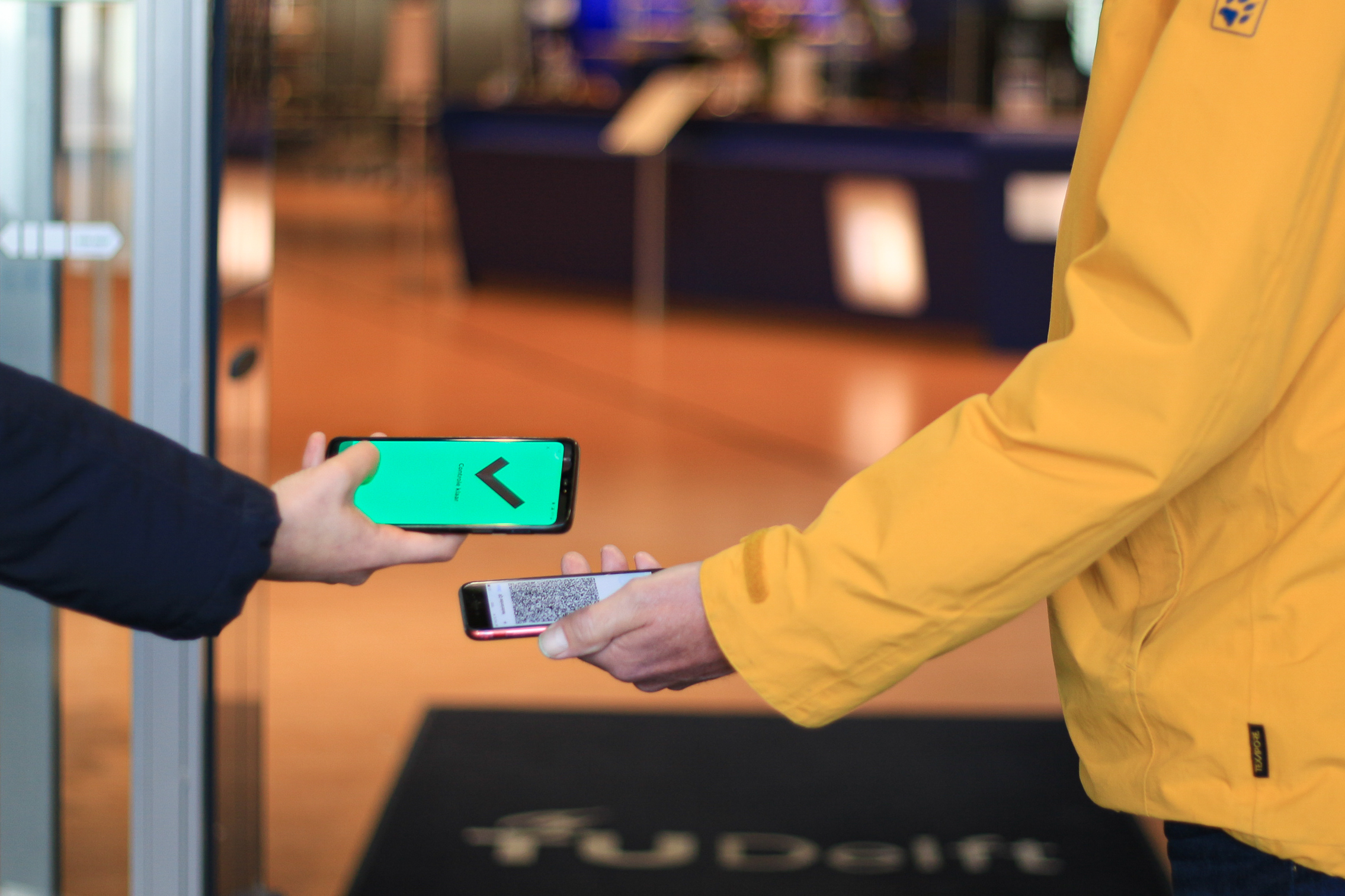Just over half of the TU Delft students and lecturers would consider it acceptable to forbid access to unvaccinated students and staff, a survey from Delta revealed.
53 percent of those surveyed would consider it acceptable to forbid access to unvaccinated students and staff. (Photo: Justyna Botor)
This week, Delta polled what TU Delft students and staff think about the possible implementation of a QR-code check on campus. And what does the TU Delft community think of the government’s idea to temporarily deny access to campus for unvaccinated people? That is the so-called 2G variant that is currently a hot topic of debate. You would only gain access to certain locations if you have been healed from a coronavirus infection or vaccinated (a negative coronavirus test is no longer sufficient).
1448 people completed the survey: 1025 students, 154 lecturers and 269 support personnel. 90 percent of the respondents have been vaccinated. The level of vaccination in all target groups was high: students 90 percent, lecturers 95 percent and support staff 89 percent.
Access prohibition
More than half of all those surveyed is a proponent of stricter access criteria. 53 percent of those surveyed would consider it acceptable to forbid access to unvaccinated students, staff and other campus visitors. Lecturers are especially in favour (64 percent).
Students and support staff seem to be more tolerant of unvaccinated people. There are more unvaccinated people in these target groups, which could partly explain the difference. When asked whether unvaccinated students should be denied access to campus, 53 percent of the students and 48 percent of the support staff agreed.
Slightly more than half of them felt that campus should be closed to unvaccinated employees if they can also do their work remotely. Again, lecturers are especially in favour (65 percent), students (51 percent) and support staff (54 percent) are more tolerant.
Strikingly, several concerned employees left comments at the end of the survey. They have noted that the students are being worn down. “I am willing to comply with the strictest measures if that means that the students can go back to ‘normal’ studying. Delay is practically inevitable and drop-out threatens. It is terrible if after working so hard for your study programme, you suddenly can’t do it,” wrote one lecturer.
2G policy
Of the respondents who were not vaccinated, only 9 percent said they would get vaccinated if a proof of vaccination or recovery is required for access to campus. Thus, the 2G proposal seems to be a less effective measure to convince people to be vaccinated (at least at the university).
But regarding the number of short-term infections, the measure can make a difference. Based on models commissioned by Fieldlab evenementen, members of the Safety Sciences research group (Faculty of Technology, Policy and Management, TPM) calculated that a 2G policy at events leads to 25 percent fewer infections and 93 percent fewer hospital admissions than a 3G policy. The same effect can be expected at lectures at the university, claimed the researchers when asked.
- Read also: ‘2G leads to fewer infections in lectures’
When asked about the best way to organise education in the near future, opinions differed widely. Only 5 to 6 percent of the students and lecturers would prefer to have all education online. 37 percent of the students and 44 percent of the lecturers would prefer a mix: partly on campus (in combination with a QR-code check), partly online. About 45 percent of both groups would prefer to have all of the education on campus, whether combined or not with QR codes or mandatory coronavirus tests. 13 percent of the respondents opt for entirely different options such as partly on campus without a QR-code check and partly online.
“Partly on campus; and certainly for skills training. And then without a QR-code check, but with sound hygiene measures,” wrote one respondent. Another felt that TU Delft should make the threshold as low as possible for students to prevent dropping out. “I even believe that this is an extremely urgent measure. Staying motivated under these conditions is no easy task.”
Accountability
The survey was conducted from 5:00 PM on Monday 15 November 15 to 10:00 AM on Thursday 18 November, and was announced on all Delta communication channels (website, newsletter and social media).
1,545 respondents filled in the survey. 97 participants did not complete the questionnaire. This left 1,448 usable and fully completed surveys. Of these 1,448 respondents, 70.78 percent were students, 10.64 percent were lecturers, and 18.58 percent worked as support personnel.
This representation deviates somewhat from the actual distribution at TU Delft with 27,927 students (reference date 1 October 2021), 5,166 academic employees and 2,369 support employees (reference date 1 March 2021). If we convert these numbers into percentages, then the students and lecturers are slightly underrepresented in the survey, and support staff slightly overrepresented.
For an estimated total population of 27,927 students and 7,535 employees (total 35,462), 1,448 usable questionnaires were completed. With a confidentiality interval of 95 percent, the error margin is thus 2.52 percent. The error margin represents the extent to which the survey results match the entire population. If 60 percent of the respondents answered ‘yes’ with an error margin of 2.52 percent, it means that between 57.48 percent (60-2.52) and 62.52 percent (60+2.52) of all people in the general TU Delft population feel that the answer must be ‘yes’.
It must be noted that the survey could also have been taken by people who have no active position within TU Delft. Because we distributed the questionnaire only through our own channels, we assume that the vast majority of respondents were TU Delft students and employees.
More information about the survey and the figures is available upon request.



Comments are closed.